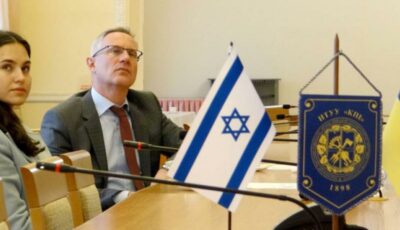
The world academic community is expanding its support for Ukrainian higher education
The European University Association (EUA) suspended the membership of 12 Russian universities due to their support for Russia’s invasion of Ukraine
In addition, since the invasion of Ukraine by Russia on February the European Higher Education and Research Community has expressed its unwavering support for Ukrainian universities, students, and staff.
At the same time, the Association will convene the National Conferences of Rectors of its members to identify the best way to work collectively to support Ukrainian members, in partnership with relevant organisations such as the Endangered Researchers and the Magna Charta Observatory.
For the time being, it will also cut off contacts and cooperation with any central government agency of the Russian Federation or any other country that actively supports the Russian occupation of Ukraine urges its members to consider doing the same.
Guild of European Research-Intensive Universities said that institutions needed help from governments to be able to provide practical assistance.
“We call on governments to enable universities to support Ukrainian students in continuing their education, and to support Ukrainian academic staff as much as possible, so that their education and work can continue as seamlessly as possible under the circumstances,” the guild said.
The European Council of Doctoral Candidates and Junior Researchers (Eurodoc) and the Marie Curie Alumni Association called on European governments to allow Ukrainian academics to stay in their countries, and asked European research institutions to suspend all cooperation with Russia on research that could have military applications.
Two trade union bodies, Education International and the European Trade Union Committee for Education, also published a joint statement supporting Ukraine and condemning the invasion.
As refugees flock to neighbouring countries, researchers across Europe have put together a grassroots campaign to help Ukrainian colleagues. Shortly after the war started, Sanita Reinsome, a science communicator working on a COST Action project (European Cooperation in Science and Technology) in eastern Europe launched the Science for Ukraine account on Twitter and called on European research organisations to help Ukrainian colleagues.
Dozens of organisations replied and the initiative snowballed into a global project, with its own website where people can post jobs in academic and research institutions across the world. Hundreds of jobs have been posted so far. Some universities have repurposed existing vacancies, while others had the funding available to create new positions or increase the number of PhD grants for the 2022-23 academic year.
Universities in Central and Eastern Europe have already begun helping students, academics and researchers affected by the war – but the scale of the problem is still unknown.
Universities in Czechia condemn the Russian invasion of Ukraine and promise to support Ukrainian students currently living in Czechia and also their relatives from areas affected by war.
Charles University allocates at least 150 beds at their dormitories to accommodate Ukrainian students, staff and their families. In cooperation with humanitarian organisations, the Charles University Endowment Fund is going to provide also financial aid.
Czech Technical University in Prague has around 450 students from Ukraine. So far, there’re no requests from students to discontinue their studies and the university promised to support them by any means necessary.
The University of New York in Prague also conveyed solidarity and support. Their community consists of more than 90 nationalities and they’re proud about it.
Masaryk University in Brno decided to terminate agreements with four Russian universities immediately. This is by no means to punish Russian students and academics but to cut ties with Russian universities that are state institutions and therefore represent the government. The university is preparing assistance for their Ukrainian students and staff like psychological counselling and special scholarships. MU has also opened the MUNI HELPS Volunteer centre connecting students in need with the Ministry of Education and Ministry of Foreign Affairs as well as the Ukrainian embassy.
Comenius University in Bratislava, Slovakia,is already lending a helping hand to its Ukrainian and Russian students affected by the conflict, and is open to receiving refugee scientists from Ukraine.
Przemysław Wiszewski, rector of the University of Wroclaw in Poland, the country which has so far received the largest influx of refugees: “We can’t even assess how many of such students will be in Poland in a short time, not even to think how many will stay in Poland.”
Many universities are also offering accommodation and help relocating, including for families of existing university staff and students. “Some of the family members expect to come to Estonia, so we are trying to organise financial support,” says Toomas Asser, rector of the University of Tartu in Estonia. The university is also providing financial and psychological support to its Ukrainian students.
Israeli universities support Ukrainians in wartime
Tel Aviv University, the Hebrew University, the Technion are among the institutions opening their gates to colleagues from embattled Ukraine.
Israeli universities are coming to the aid of their Ukrainian students, as well as researchers and students affected by the turbulent situation in the war-stricken country.
Ben-Gurion University of the Negev has made its psychological services available for students affected by the war in Ukraine, and has invited students and researchers in Ukraine to spend a semester at the university, providing them with accommodation, a scholarship and assistance in obtaining a student visa.
The Hebrew University of Jerusalem has reached out to students of Ukrainian origin who have been affected by the war, offering them immediate academic, emotional and financial support. It is also inviting students and academics from Ukraine to continue their studies or research in Jerusalem for a few months, providing them with monthly stipends and free room and board on campus. It is also offering temporary academic posts to Ukrainian academics and graduate students.
Reichman University, formerly known as IDC Herzliya, has 14 students from Ukraine. Students in Israel are being offered psychological services, exemptions and financial aid as needed.
At the Technion–Israel Institute of Technology in Haifa, students affected by the war have been offered emotional support. The university also sent out a letter inviting students and academics from Ukraine to spend a year at the institute, and has set up a designated budget for this purpose.
Tel Aviv University, too, has designated a budget of around $300,000 to welcome Ukrainian students and researchers to spend the upcoming semester at the university. The scholarships will cover tuition and living expenses.
UK universities are supporting Ukrainian students during Russia’s war on Ukraine
The University of Cambridge’s collegiate community has watched with mounting outrage the events unfolding in the wake of the Russian Federation’s invasion of Ukraine.
Prof Stephen J Toope, Vice-Chancellor said: “Ongoing events will be especially worrying to our Ukrainian students and colleagues with families and friends now directly caught up in armed conflict. The University’s staff and student counselling services can be contacted by those in need of counselling support – please refer to the student and staff counselling service websites. Once again I ask that members of staff with concerns talk to their Heads of Department, as well as Departmental Wellbeing Advocates, for advice on available support services. Colleges have been advising their staff and students over the past few days, and students in need of support are encouraged to speak to College tutors.”
Newcastle University’s Vice-Chancellor and President, Professor Chris Day, and Professor Julie Sanders, the university’s Deputy Vice-Chancellor and Provost, wrote to all colleagues in light of the situation in Ukraine. They outlined the practical and wellbeing support available to staff and students at the university.
Northumbria University also outlined the support it was offering to its students who have been affected by the Ukrainian crisis. They announced that they were offering support via crisis councillors and 24 hour support networks and one-to-one welfare support.
Following Russia’s invasion of Ukraine, Durham University contacted its students who were studying in Russia as part of their course and asked them to return to the UK at “no detriment to their learning” or accreditation.
The University of Sunderland said it was working to support its Ukrainian an Russian students, regardless of their location, whether they’re in the UK or overseas.
USA
George Mason University offers support for Ukrainian students/
MIT’cut ties to a high-tech campus partnership with the Russian government. But university should take additional steps, such as to make public statements in support of Ukraine, expose any information about funding and ties to Russia-related projects, and provide resources to the community about how they can help.
FINLAND
Finnish universities UNIFI expresses support for Ukraine and the Ukrainian university students and condemn Russia’s military action in Ukraine.
By:
https://www.universityworldnews.com/; http://thepienews.com/news


You May Also Like

Towards the Development of IoT Management in Intelligent Industry
21.10.2024
Commission is shaping up €500M generative artificial intelligence calls
23.07.2024
